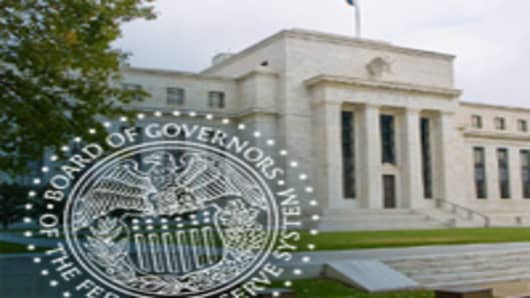A growing bloc of Federal Reserve committee members favors selling some of the Fed's $1.25 trillion in mortgages and other non-Treasury assets that were bought during the financial crisis to unfreeze credit markets and keep interest rates low, several Fed sources told CNBC.
At least six members of the Fed's policymaking commitee favor near-term asset sales, which—if the economy keeps improving—could lead the Fed to announce a program to sell assets by the third or fourth quarter of this year, these sources said.
While financial markets are focused on the language of the policy statement from next week's meeting of the Federal Open Market Committee, the asset sales are likely to be debated vigorously. The asset sales are not imminent and the views of these members are not monolithic.
If the Fed starts selling too quickly and the market becomes overburdened with supply, that could drive up mortgage rates quickly up and slow the housing recovery.
Yet the Fed is simultaneously faced with having its burdened sheet encumbered with the weight of the mortgages and doesn't want to delay too long, either, and risk inflation by keeping rates artificially low. Many Fed members are concerned that holding mortgages amounts to a politically motivated subsidy of the housing market and would like to return to holding only more neutral treasuries.
Some members, such as Richmond Fed President Jeffrey Lacker want to begin selling assets immediately. He apparently could foresee the Fed retaining the language to keep interest rates "exceptionally low for an extended period" while the Fed unloads the mortgage-backed securities it purchased during the financial crisis.
Other members, such as St. Louis Fed President Jim Bullard, would not be so quick to pull the trigger, but wants asset sales to be one of the first acts the Fed takes to tighten monetary policy.
He favors the assets sales over some of the complicated plans of the Fed to drain liquidity. They include reverse repos and term deposits. Those transactions would only temporarily drain liquidity and would not permanently fix the problem of the bloated size of the Fed’s $2.5 trillion balance sheet.
Meanwhile, some doves on the board are more concerned about the economy and are content to let the mortgages runoff, through prepayment, refinance and default. The concern of the hawks is that this would take too long and would leave the Fed unprepared for the next recession.
The one who matters most, Fed Chairman Ben Bernanke, is said to be still unconvinced on the asset sale issue and sees it more of an issue for next year or beyond. But he has moved towards the hawks in recent weeks, changing his rhetoric publicly to keep the option more on the table. This change was said by some to be the result of pressure from hawks.
Whatever the reason, Bernanke typically likes to remain in the center and his shift is a sign that the board has turned more hawkish overall on the issue.
Key to any decision will be what Fed Governor Kevin Warsh believes. He hasn't spoken much on the issue, but has written that the Fed needs to be as forceful on the way out as it was on the way in. He is likely to join the hawks only if the economy is clearly on a recovery path.
No mention of assets sales is expected in next week’s statement but the debate will show up increasingly in public and in the minutes of this meeting and future meetings.



